 |
 |
| |
|
|
| |
|
|
| |
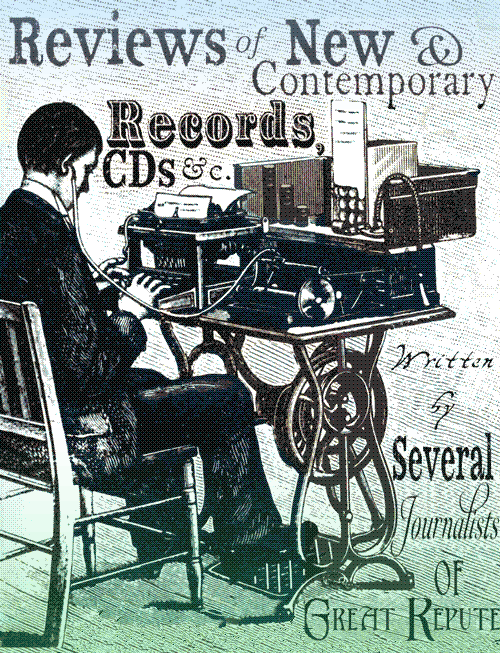 |
|
| =
July 2020 = |
|
|
| Øyvind
Holm |
| Gilroy Mere |
| The Clientele |
| Vinyl Williams |
| Autotelia |
| Diogo
Strausz |
| Noveller |
| Theodor
Bastard |
| Band
of Rain |
| Jasmine
Dreame Wagner |
| Cubs |
| Pefkin |
| Anthroprophh |
| Gnod and Joao Pais |
| Kooba Tercu |
| J.
Zunz |
| Och |
| Waterless
Hills |
| Adra |
| Wolfgang
Muthspiel |
| the Left
Outsides |
| |
| |
|
|
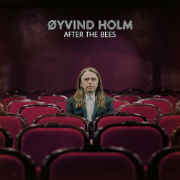
Home
|
ØYVIND
HOLM – AFTER THE BEES
(LP
on Crispin Glover Records)
It’s
no secret that Norwegian singer, songwriter and
multi-instrumentalist Øyvind Holm has been a bit
of a hero hereabouts ever since he debuted with
his band Dipsomaniacs back in 1997.
Steeped in the psychedelic pop
underground, his songs are invariably melodic
and often annoyingly catchy - you find yourself
humming them for weeks afterwards at the most
inopportune of moments!
Nowadays leading one of the finest cosmic
Americana acts on the planet, Sugarfoot, ‘After
the Bees’ is Øyvind’s second solo album, and
just like the first (2003’s ‘The Vanishing Act’)
it’s a successful attempt on his part to escape
the confines of a band and channel his inner
Lee, Crosby, Lennon & McCartney. Although
hopefully unlike the first it won’t turn into a
full-time project of its own (the live band that
Øyvind put together to play some shows to
support his solo debut in 2003, which included
Hogne Galåen from Trondheim’s Kulta Beats,
eventually became Deleted Waveform Gatherings;
and Sugarfoot themselves were subsequently
formed by Øyvind and Hogne as a side-project
between DWG albums - so there’s a history of
Øyvind’s solo albums marking a major turning
point…)
The
songs
on offer here are though all recognisably by the
same masterful hand, and several are positively
outstanding - not least the brilliant title
track itself. ‘Gut Feeling’ could easily be an
outtake from the high-water mark of the
Dipsomaniacs, ‘Praying Winter’; the closing
‘A.M.’ simply oozes 70s psychedelia, and the
poppy ‘Masterplan’ features some gloriously
high-flying guest vocals from Ida Jenshus - who
can also be heard on ‘Others Never Stood a
Chance which is the A-side of a 45 that’s
included with the vinyl (though for my money
Øyvind’s ‘Her Words’ on the B-side is the pick
of the pair). Plus since the album is on Crispin
Glover Records, for whom nothing is too much
trouble, there’s a CD of the album enclosed as
well. A CD which rather beguilingly does NOT
include the two extra songs on the 7” that comes
with the record. I spoke to Øyvind recently
about the quality of the releases that Torgeir
at Crispin Glover Records has consistently
produced, and he agreed: “It’s
wonderful
to be on a label that values the artwork side
of it all this much. More often than not it
turns out quite expensive, but over the years
it has become a trademark for his label. Being
a record collector myself, I know that a good
artwork adds to the album experience. A
thumbnail on Spotify doesn’t quite have the
same effect…”
Indeed,
it
doesn’t. Do yourself a favour and track down a
copy of this while you can - Crispin Glover
Records is fast becoming one of those labels
that people pre-order everything on release just
because their reputation is rightly so revered.
And this is definitely one of the high points…
(Phil McMullen)
|
| |
|
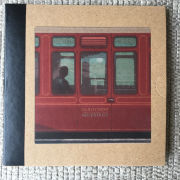
Home |
GILROY
MERE – ADLESTROP
www.Claypipemusic.co.uk
Following
on from his widely acclaimed album about Green
Line buses, Oliver Cherer (Gilroy Mere) tackles
another form of travel, this time it is defunct
railway lines, all the stations victims of Dr.
Beeching’s drastic cuts in the sixties. This was
hinted at with by a flexi disc released earlier
in the year, ‘Over The tracks’.
It
begins with a nature based poem by Edward Thomas
( ‘Adlestrop’) accompanied by birdsong. The
music then kicks in with ‘The Age Of The Train’,
which bubbles merrily along, gaining momentum,
the basic tune is lightly motorik and does
indeed somehow sound like the very definition of
a train’s journey, like being in at the front of
as it travels along, instruments drop in at
various points combining to create a very
pleasing piece. The title track ‘Adlestrop’,
follows this, a dreamy melodic tune with hints
of trumpet, a ghostly memory from when steam
trains arrived there. Oliver actually recorded
an album entitled ‘Ghost Stations’ in his
Dollboy guise a few years back, for the small
boutique label Second Language, this album was
about the abandoned tube stations which are part
of the London Underground system. ‘Bethesda In
the Rain’, well let’s face it, it always seems
to be raining in Wales, this one is more piano
based, with light percussion and analogue
keyboards.
‘End
Of The Line (Alderburgh)’, follows, replete with
sparrows chirping and waves crashing, it’s a
short piece of music, full with strange
unnameable instruments. ‘Just A River’, is more
traditionally song based, sung by Oliver, with
light percussion, acoustic guitars, and more
analogue keyboards, a lilting tune, heavy with
nostalgia, “an empty space with wild flowers,
butterflies and bees”. More birdsong twittering
in the background, maybe a few licks of banjo,
but it also possesses an unnerving quality, of
being alone in the wilderness, but shot through
with something just out of reach. My own local
abandoned railway line is up next ‘The Cranleigh
Line’, a ghostly little song with accordion
flourishes. The line was closed, like the rest,
because at the time not enough people used it,
although now it would be full, just like the
lines still in operation.
‘Torver
& Coppermines’, generates an uneasy, queasy
feeling, lightly choral, accompanied by more
very well recorded birdsong, a real feature of
the album. ‘Christ’s Hospital’, has a bleak deep
midwinter vibe to it and twinkles away like some
wayward musical box and has some mournful
trumpet, lending it a jazzy noirish quality.
’Black Dog Halt’, is simply beautiful, I have no
idea how many instruments Oliver owns, but I am
hard placed to name any of these, but they do
combine to create a pleasing piece of music.
‘Ravenscar’, follows it, and the heaven’s open,
it is an impossibly beautiful piece of music,
with our old friend the Jenny wren singing its
heart out throughout most of its duration.
During my lockdown walks, the birdsong that I
heard the most was from this plucky little
fella, our most common bird. The album ends with
‘Star Crossing’, a watery tune of no small
beauty. Another superb album from Clay Pipe. 600
hand numbered red vinyl copies, comes with cut
out model by Gary Willis. (there will also be a
short run of 150 cassettes, sans cut-out).
(Andrew Young)
|
| |
|
|
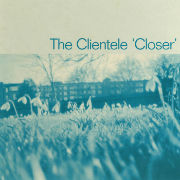
Home
|
THE
CLIENTELE – CLOSER
(single
on Merge
Records)
It
may be only a single, and a cover at that, but
with the state of the world today, I’ll take any
new release by The Clientele as a cause for joy
and celebration.
“Closer”
was written by Mick Head and originally appeared
on Shack’s 2006 album ‘The Corner of Miles and
Gil.’ But
the boys transform the beautiful song into truly
a Clientele work.
Alasdair’s voice is in fine fettle.
Mark and James are steady as ever behind
him. The
arrangement - classy, autumnal and melancholy -
has their signature all over it.
Although it has their classic canter, the
song takes a brief, unexpected rock diversion,
which is straight out of the original.
All
proceeds for the song will go to Black Lives
Matter via Bandcamp.
(Mark
Feingold)
|
| |
|
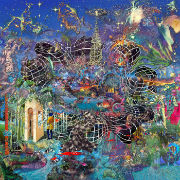
Home |
VINYL
WILLIAMS - AZURE
(LP/CD/Cassette/Digital
on Requiem
Pour Un Twister Records)
You
need only listen to a little bit of Vinyl
Williams’ LP Azure to reckon not necessarily who
created it, but rather from where it came.
Responses of Southern California and the
clouds would be equally suitable.
Vinyl Williams is the outfit led by
musician and visual artist Lionel Williams.
He also happens to be the grandson of
film composer John Williams (Star Wars, E.T.,
etc.). Azure
is like a warm breeze; light, full of air, and
you will happily float away with its currents.
Azure
is a multi-colored melodic psychedelic pop candy
store with eleven tracks/confections bursting
with flavors. Williams’
whispery vocals come drenched with reverb.
The songs are mega-dreamlike, layered and
billowy, as Williams hereby conducts a master
class in atmospheric sound construction, laden
with guitars, synths and effects.
That doesn’t mean the songs are formless
and oozing. Rather,
they’re built on catchy melodies, with often
snappy rhythms, amid diaphanous vocals and
swirling, floating wads of pastel-shaded cotton.
Songs frequently change-up tempos
mid-track, sometimes even approaching prog-like
complexity, like a hot air balloon picking up a
new draft to carry it away in a vague direction.
With titles like “Magicland,” “Heaven,”
and “Sunny Moon,” you get the picture where the
soul of Azure lies.
Instrumental closer “Earth Observatory”
has multiple curves in store, including a false
ending and a spacy finale.
Vinyl
Williams reminds me closest of their fellow
Angeleno Morgan Delt (for whom Williams has
created music videos).
But listeners will pick up bits and bobs
of Tame Impala, Stereolab, The Free Design, and
Amorphous Androgynous.
There is also a distinct undercurrent of
Tropicalia in the song construction, chord
changes and guitar playing.
Lionel
Williams also created the stunning, vibrant
cover art work, in which he combined over 25
paintings by different artists into the album
collage.
Azure
is feather-light, plush sunshiny psych, though
not without depth and impressive artistry.
Bring a pair of shades.
(Mark
Feingold)
|
| |
|
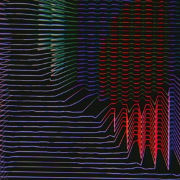
Home
|
AUTOTELIA
– 1
(LP/CD/DL
from
Rocket Recordings)
At some point listening to this, I managed to relocate my third eye. I
can’t remember where I’d mislaid it or when I
last saw it, I only know that I was beginning to
miss it more and more especially as we take the
first tentative steps out of the great
quarantine of 2020.
Still, I don’t suppose any of that matters to Demian Castellanos and Tom
Relleen who comprise Autotelia (which the
helpful one sheet explains is something to do
with the pursuit of purpose or curiosity – no,
me neither) or for that matter those “terrible
twins” Chris and Johnny Rocket for whom this
welcome release is number 193. Castellanos and
Relleen also collaborate as part of The
Oscillation, while Tom forms one half of the
artily experimental Tomaga, which is what this
latest venture most closely resembles in its
form and conceptual approach. It’s a project
that has been nudging along for a while now -
there’s a live clip from 2018 on You Tube for
instance - and mines the more interesting,
darker seams of experimental kosmische (don’t
you just hate the term Krautrock?).
‘First Flight’ hits you with wave upon WAV of tightly layered intense
synth textures, eschewing insane, nay inane,
BPMs or indeed anything too strenuously
toe-tapping and all the better for it. Elsewhere
the more percussive ‘Red Bloom’ and ‘Future
Island Of The Gods’ brood and percolate, all the
while Castellanos’ guitar buried in a thicket of
electronics so as to constitute a second synth.
However, ‘Thinking Makes It So’ introduces more
discernibly melodic guitar refrains which at
first sound stuck on repeat but are soon
revealed to be nicely nuanced and subtly varied,
adopting an air of menace from half way as the
ambience yields to ever more enveloping drone,
the chords becoming denser and the wall of noise
closes in on you. Best of all, ‘Storm at
Tucanae’ is plain mesmeric, the wash of synths
and Castellanos’ twanging single notes conjuring
up not so much a storm as a gentle, cathartic
rinse. All’s swell in the world, then, after
all. Avoid if you crave songs, seek out if you
enjoy having your synapses sonically stroked
(not to mention stoked). No words. Really there
are no words.
(Ian
Fraser)
|
|
|
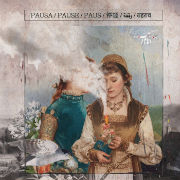
Home
|
DIOGO
STRAUSZ – PAUSA (SINGLE)
(Bandcamp)
Diogo
Strausz is a Brazilian producer, now based in
Paris. He
wrote the instrumental “Pausa” in response to
the lockdowns caused by the Coronavirus.
He intended it to be recorded
individually by musicians in isolation in their
homes and he assembled the finished product in
Paris. We
have now become accustomed to musicians both
playing live and recording in isolation, and if
we’re being honest, recording in disparate
locales was going on well before the pandemic.
But this project took on a life of its
own and we’re talking a small orchestra’s worth
of musicians in France, Brazil and the US, some
of them overdubbing several parts.
The
charming four-minute piece reminds me slightly
of George Gershwin.
The rhapsodic work (see what I did there)
is performed by piano and orchestra, and,
written in Paris after all, is unabashedly
romantic and delightful.
But
the project doesn’t end there.
Filmmaker Jacob Perlmutter created a
stunning video for Pausa that utilizes
breathtaking drone footage from cinematographers
around the world of the mostly empty streets and
parks in places like Mumbai, San Francisco,
Milan, Athens, Quito, Rio de Janeiro, New York,
Berlin, Tel Aviv, Sydney, London, and São Paulo,
among others.
The
resulting work reminds me of walking into a TV
store and seeing the banks of big screens on the
walls, playing some prerecorded travel footage
intended to show off their 4K High Definition
TVs. Only
you realize quickly the scenes are mostly devoid
of people and cars.
The combined effect of the video and the
song is both spectacularly beautiful and
heartbreaking.
Do
yourself a favour.
Check out the video (in as large a screen
as you can manage), and throw a couple of
shekels in Diogo Strausz’s account.
It might be the best spent four minutes
of your day.
(Mark
Feingold)
|
| |
|

Home |
NOVELLER
-
ARROW
(LP/CD/Digital
on Ba
Da Bing! Records)
We’ve
seen the evolution of guitar music advance so
far that sometimes it doesn’t bear the faintest
resemblance to the output of a guitar, that is,
of our perception of one.
That’s the sonic territory of Sarah
Lipstate, aka Noveller, the prolific artist, and
her tenth album Arrow.
Listening to the eight dense instrumental
tracks unfold – because that’s what they do,
they slowly unfold and reveal themselves to you
– one can’t help but stop every few moments and
reflect, “wait, that’s all done on a guitar?”
And I recommend you do just that, for it
just boggles my mind.
Lipstate
has bounced around from Louisiana to Austin to
Brooklyn to her new home in Los Angeles, with
Arrow being her first record since relocating
there. Along
the way she’s picked up a wealth of admirers and
collaborators, most recently Iggy Pop, with whom
she’s toured and recorded.
But Arrow sounds more Brian or Roger Eno
than Iggy. This
is far more than ambient or wallpaper music.
It’s a wonder of creativity.
Noveller
brings along an artillery of processors, loops
and effects boxes to transform her guitar sound
to – well, you name it, she can do it.
Mind you, her songs aren’t merely one
long repetitive parlor trick.
The lady’s got serious compositional
chops. The
songs on Arrow are cinematic, often brooding,
expansive works full of depth and soul.
This is music that sets your imagination
churning. The
album is sequenced with only very short pauses
between tracks, and flows smoothly as an
all-encompassing work.
Opener
“Rune” draws the curtain on a Phantom of the
Opera playing in the middle of a volcano in
hell. “Effektology”
is all full of textures and tactile sensations.
“Zeaxanthin,” the album’s longest and most
remarkable track, alternates between pistons
pumping amid some colossal machine, expansive
glacial ice, Mellotronesque washes, and ethereal
angelic themes in its almost nine minute
journey.
“Pattern
Recognition” opens by reminding us this is a
guitar, with, um, a repeating pattern, and one
of the few that really sounds like a guitar.
But that is soon overtaken by a dark
sense of expanding dread and foreboding, itself
replaced by shafts of light pouring through the
clouds, sounding again like Mellotron.
(Think about that for a moment, a guitar
emulating a Mellotron.)
“Canyons,”
the track most obviously reflective of Lipstate
exploring her new LA home turf, is all spiky and
throbbing, at once suggesting both the
three-dimensional aspect of nature’s canyons in
her front yard, and the urban canyons in her
back yard. “Pre-fabled”
is the most majestic song on the album, one of
the few offering pleasure and comfort.
It sparkles like sunlight shimmering and
bouncing off the ocean, with the swell and dips
of the waves, before disappearing into a
corkscrew of processed sound.
“Thorns”
returns to gloom and doom, like descending into
a dark, giant prehistoric cave.
You don’t know what’s down there, and you
probably don’t want to know.
Closer “Remainder” starts with the most
overtly “conventional” sounding guitar sound on
the album, almost as a before closing reminder
of its origins.
The song is a cinematic tale of mystery
and wonder, like the spaceship descending to the
unexplored planet.
Noveller’s
Arrow is full of widescreen imaginative sound
explorations for guitar.
It also makes for grand listening in the
expanse of nature in the great outdoors.
Definitely worth checking out.
(Mark
Feingold)
|
|
|
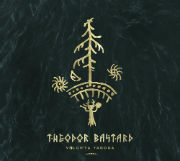
|
THEODOR
BASTARD
- VOLCH'YA YAGODA
Hailing from the Russian
Federation, Theodor Bastard have for some years
been making culturally infused progressive rock
of a very high standard. I reviewed their
outstanding albums "Oikumene" and "Vetvi" in
earlier Rumbles, and now there is a new album to
add to those and to others from this superb
band. The lyrics are sung in Russian, but I've
found that makes no difference to my enjoyment
of this band. So, it's a case of… "Privet!"
This collection of new tracks
opens with a gorgeous flute and drone
instrumental, setting the listener up for the
song-based delights to come. 'Shumi' is
progressive rock of the best kind - melodious,
superbly sung by Yana Veva and played by Fedor
Svolotch and the rest of the band. I was
reminded of that fine group Paatos when I heard
this. 'Skejgored' is similarly terrific, with an
anthemic riff running through it, and much by
way of production details. The band uses a wide
variety of unusual instruments, and this track
is no exception; lots of percussion in the mix.
'Urzala' is strangely compelling, with its weird
sampled voices and Russian-styled backing vocals
- a terrific track. Yana Veva channels more of
her own cultural background in the vocal here.
'Les' opens with rippling ukulele and a soft
vocal before sampled and played percussion
enters the mix, then more by way of synths,
flute and other voices - very atmospheric, and
the melody is as strong as all the previous
ones. This is a standout track. 'Kamen, Sneg,
Metal' also opens with the sound of the ukulele
before a melancholic lyric unfurls.
The second half of the album
opens with another particularly strong song,
'Secrety.' Perfectly produced and played, it
leads into a run of three eerie progressive
tracks, all of them evoking epic landscapes and
times: 'Requiem' with its bells, 'Pozhato' with
its glitchy sampled percussion, and 'Volchok,'
all deeply reverberated vocals and moaning
Russian winds, gorgeous synth solos decorating
the mix, and a sampled duduk. The album closes
with 'Obereg,' which via keening vocals and
mesmeric drones manages to wrap up the
collection perfectly.
Housed in the band's usual
glorious packaging - this time based around
moody photographs of trees - this is progressive
rock of the finest variety, and shows a band
unafraid to move on, whilst keeping the standard
of composition and musicianship extremely high.
The CD version is available in a limited edition
of 500. Whether you get the CD or the download,
don't miss this one!
(Steve
Palmer)
|
|
|
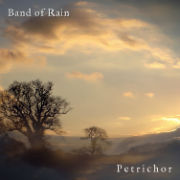 |
BAND
OF RAIN - PETRICHOR
Chris Gill's Band Of Rain have
released five terrific albums since 2004,
exploring a guitar-based progressive/gothic rock
sound. On this excellent new album, Chris has
put together a five member line-up, including
bassist Jon Camp from the exceptional '70s band
Renaissance.Chris has a twisting, winding style
of layering guitar parts that makes his music
immediately recognisable, here augmented by
Camp's twanging bass and the almost operatic
vocals of Matthew Corry. All very promising,
then.
'Daughter of the Moor' is the
opening cut, a song that rolls by in fine
progressive style, augmented half way through by
various solos. The sound is great, Camp's
spiralling bass contrasting nicely with the
background riffing. Emotive vocals and changes
in mood make this a really good opener. 'The
Craft' is similar in tone, with a soaring guitar
taking the lead. Heavier guitars come in for the
chorus; nice production.'Larkspur' is a much
more synth based track, here resting on Robert
Webb's bouncing keyboards, with which
falsetto/vocal styled singing works
well.'Merlin' begins quiet, but soon arpeggiated
guitars and a slow, solemn drum beat pick the
track up, augmented by some beautiful fretless
bass from Jon Camp- great playing on this cut.
The second half of the album
begins with 'Tupelo,' a composition by Chris and
Jon alone: heavy feel, big thrumming bass, and
lots of Chris' trademark wheeling, intertwined
guitars. The instrumental arrangement on this
track is particularly good. 'Witchfinder' opens
with the spooky sounds of the Halfway House Male
Voice Choir, before Matthew Corry returns with
an emotive vocal. The twelve minute title track
closes the album, beginning with rain (petrichor
is the smell of a the ground after rainfall - a
favourite of your editor!) and delicate synths,
which after a while merge into guitars,
keyboards and bass, then reverberated vocals,
all of which play variations on a six note riff.
The main section of the song takes various moods
and tones, with a lovely synth solo half way
through. Closing bass and vocal parts bring the
tone back to the rain of the beginning, then a
delicate coda where vocals and backwards guitars
intertwine. Great stuff!
Fans of this fine band will
love the new album. It's already picked up a lot
of great review coverage, and rightly so. This
one is for lovers of progressive rock, who will
no doubt enjoy it. (Steve
Palmer)
|
|
|
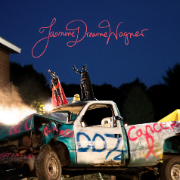
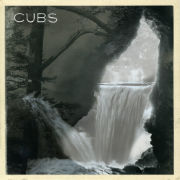
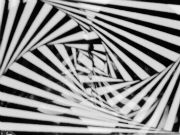
|
JASMINE
DREAME
WAGNER - SWITCHBLADE MOON
CUBS
-
FROZEN WATERFALL
PEFKIN
-
DEBRIS
Whilst
the
Terrascopic preference will always be for
physical product, especially vinyl (man, do we
love our vinyl), it seems to me that we need to
recognise and respect the many advantages of
digital music both for the listener and the
musician. For a start it is perfect for the DIY
musician as it is easy and cheap to release your
art to the world, the format is very
eco-friendly using few resources and the
listener can access music released anywhere in
the world with a click of a button. On the
downside it is easy for releases to get lost in
the tsunami of new releases, which is where this
review comes in, letting you know about three
excellent collections that are completely or
predominately digital in nature.
First up is a lovely four track EP from
Jasmine Dreame Wagner, an artist I first heard
of in 2006 when I reviewed “Vineland” released
under the name Cabinet Of Curiosities, an album
I still play. 14 years later the music is more
sophisticated and sparkles from the speakers yet
the sense of discovery and that thin veil of
surrealism remains.
Opening in moody splendour, the title
track is a delightful piano led tune that drifts
like smoke, drawing you in with siren-like
vocals and melodic sweetness. Around the halfway
mark drums add some muscle to the tune the song
rising upwards reminding me of Kate Bush meeting
The Cocteau Twins, at least in its atmospheric
intent. Similar in style, “All The King's
Horses” uses Jasmine's poetic skills to paint
pictures and tell stories, the words again
drawing you in, the music adding to the
narrative in a sympathetic way, melodies dancing
throughout.
Adding a soundtrack element to
proceedings, “White Noise” is a choral piece
with fabulous soaring vocals, a prowling cello
and a sense of the epic all ending is a ripple
of electronics which leads us nicely into
“Powder Keg”, a short instrumental that is
wonderfully constructed and ends far far too
soon, seemingly before it even got into its
stride, leaving this listener craving more,
which could be the plan I suppose. With bright,
clear production, this EP shows an artist at the
top of their creative game, let's hope for a
full album soon. This EP is also available as
both a regular and a deluxe vinyl package.
Consisting
of Cecilia
Danell,
Aaron Hurley, James Rider, Scott McLaughlin
and Keith Wallace, Cubs
create a brand of shimmering, psychedelic folk
music that is deeply engaging and immersive,
the music revealing different elements each
time you play the album, with different songs
and moments becoming more/less dominant as the
album flows from the speakers.
Opening with a flurry
of electronics and a desire to live in the
woods, “Bramble Ramble” catches hold like a
heady perfume on a summers evening, a sweet as
honeysuckle, inviting you into the album
perfectly. Once committed, the rumbling squall
of “Thunder Calling” quickly becomes a melodic
tune that reminds me of The Lilac Time or maybe
Gorkys, the softness cloaked in a quiet drone
that adds an air of tension.
With some lovely
guitar playing and delightful vocals, “The Heat
That Lies” is a personal favourite, one of those
musical moments when you have to stop what you
are doing (writing a review obviously) to just
listen, bliss, the magic continuing as
“Moonshine Sunshine” mixes Banjo, Korg MS-20 and
birdsong into a dreamy slice of drone that
spirals slowly like a leaf dropping into a
crystal pool, the ripples remaining even as the
song fades.
Sticking with the
drones the title track has some wonderful
vocals, chiming bells and a slow motion feel as
if digging into the earth itself, that
particular spell broken as “The Beaten Path
Through The high Grass” makes its presence known
with spoken word , a sparkling mandolin and a
creeping sense of unease as a fuzzy bass adds
menace to the ghostly whole, a spooky melodica
completing the picture with a repeated melody
right at the end.
Ending the album in
style, “Aunt Myrtle” features the whole band,
blending everything that has gone before
creating the perfect Cubs song, great playing,
narrative, an air of discovery and melodies so
sweet they coat your very soul.
Actually lasting just
over 30 minutes, this album seems timeless so
easy is it to get lost in its charms an
experience to be repeated often.
Definitely working at
the outer edge of the Terrascope nation, Pefkin
(Gayle Brogan) create music that is droning,
experimental, emotional and very imaginative, a
personal journey in sound that is much better
when listened to intently, without distraction,
the music becoming alive in real time. Some of
you may remember her spellbinding set at Woolf
Music last year. Comprising tracks previously
found on other compilations 2000 – 2018, and one
unreleased one, this collection is well worth
hearing the title track sounding like My Cat Is
An Alien jamming with
a space whispering Gilli Smythe, whilst
“Very Badpipes” is an echo infested walk into an
alien landscape the sky a strange shade of
purple whilst your three headed companion keeps
all of his eyes peeled for those famed
mushrooms. At 14 minutes, “Sunblinded Vision by
a Silver Sea” has plenty of time to build the
atmospheric tension, beginning as a twinkling
splash of light it slowly transforms into a
writhing drone, so slowly that the change is
hard to hear, it just is.
With a more traditional
song based approach, “North Sea Lights, Winter
Nights” is a welcome dash of melody albeit with
a drone creeping underneath, whilst both “Peek
Out Poke” and “Extinct Birds” shatter the notion
of melody the former a rattle and shake of noise
and repetition whilst the latter is a field
recording grooving with a pict.
As this collection
moves on the pieces become more stretched the
drones more distant as if being played on a
faraway star until finally, “Frozen Warnings”
takes you deep into space, leaving you floating
free in an infinite universe. As a Terrascope
reader I am sure you are well aware of Pefkin
and this is a fine collection that should be
added to your Pefkin collection.
For roughly the same
price as a round of drinks, these three albums
are all worth investigating, just head on to
Bandcamp and type in Jasmine Dreame Wagner,
Rusted Rail and/or pefkin for instant sonic
enlightenment. (Simon
Lewis)
|
|
|
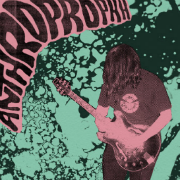


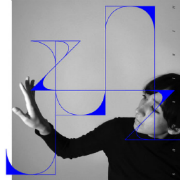
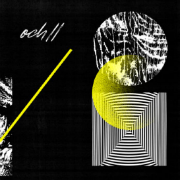
Home |
ANTHROPROPHH
– TOILET CIRCUIT EP
GNOD
& João Pais Filipe – FACA DE FOGO
KOOBA TERCU – PROTO TEKNO
J. ZUNZ – HIBISCUS
OCH – II
(all Rocket Recordings)
It’s time for this month’s quick fire round, so fingers on buzzers and
Fraser’s on stun.
Time will tell if Anthroprophh
will be spared the bother of having to return to
play the Toilet
Circuit
depending on how things “pan” out post
pestilence/pre-second wave. In the meantime this
short sharp jolt to the senses will do nicely.
After twenty or so seconds of tentative pogoing
to the opening salvos of ‘Six Six Sigma’ a
chastened scribe gladly collapses into the cold
and sinewy embrace of garage psychsploitation.
‘Too Old’ (me too, guys, me too) comes packed
with squally guitars steeped in a fittingly
squalid mix, its snotty credentials given
further authority by Paul Allen’s vocals, under
used in The Heads but which sound satisfyingly
snide and occasionally desperate here,
complementing the lyrical content. The
gloriously cacophonous, everything and the
kitchen sink title track even comes with a
Robert Wyatt-sings-Beach Boys-do-Do-Wop segment
title namecheck. Three tracks and that’s that.
It’s grubby, visceral, exciting, and intent on
throat punching home the point that modern life
is indeed rubbish. Thankfully this is anything
but.
It’s always with eager anticipation that a new Gnod release is received in our rural(ish) fastness. Part of the
thrill is wondering which version of the now
scattered “Manchester” collective is going to
show up, the ear splitting brutalist faction or
the soldering iron and sequencer
experimentalists. The fact that Faca
de
Fogo (or Fire Knife to thee and me – each
of the four titles is elemental in this regard)
is another “Gnod is my co-pilot” collaboration
would suggest the latter. Joao Pais Filipe is a
rhythm devil extraordinaire so you’d expect at
some stage to find yourself exclaiming “the
drums, the drums” at the propulsive polyrhythmic
percussion. What might wrong-foot the dear
listener is the opening woodwind section
suggesting that we were in for a session of
pre-Industrial Noise and which, up to a point,
is very much the case, veering between the
surprisingly tender (‘Faca De Terra’) and the
muscular trance of ‘Faco De Ar’ but without so
much of the malice for which Gnod are renowned
and revered. The title track introduces vocals
by which time we’re now on bleaker street folks
but still more or less in the blacksmith forge
rather than the dark satanic mill. Completing
the collection, ‘Faca De Agua’ moves a little
further out there - the propulsive, insistent
drumming indelibly stamping an afro-rhythm on
all the bleeps, moans and trouser rips of Gnod
knows what. It’s a malarial highlight from a
band that continues to confound and delight in
equal measure balancing neatly their rockist and
cybernetic inclinations. As we’ve come to learn,
no two Gnod albums are the same and that’s the
way (aha, aha) we likes it ‘round ‘ere. Or to
put it another way, they’ve gone and done it
again.
Hailing from Greece (Rocket’s international credentials are second to
none) it’s no surprise on listening to the
opening salvos of Proto
Tekno that Kooba Tercu have “form” with the avowedly un-acoustic Hominid Sounds
label or that they share band members with the
likes of Casual Nun, both of whom may already be
familiar to The Readership. What is no less
welcome is the variation on offer. There are
noisy souped-up rockers (‘Benzoberry’), old
school strut ‘n swagger (‘Cemento Mori’),
kling-klang techno (‘Filter Feeder’) and
Gnod-like panel beat repetition with menaces
(‘Qasar’) and that’s only the half of it. The
first half in fact. Matters reach high point,
though, on the intensely insistent and shamanic
‘Fair Game’ and math pop-meets-Can style ‘Puppy
Pile’. It took just two listens before I fell
for it.
J.
Zunz
is Lorena
Quintanilla
(one half of hugely accomplished Mexican duo
Lorelle and the Absolute) and Hibiscus
is an absolute delight. Cyclical synth
patterns and sickly ambience, shot through
with a cosmic bleakness, garnished with a
dollop of deconstructed shoegaze and plenty
of narcotic sensuality. From the gloriously
queasy, breathy ‘Y’ there is an artful
inventiveness that owes something of a debt
(consciously or otherwise) to the
proto-electronica of Laurie Anderson. ‘Four
Women and Darkness’ evokes the ‘In Madrid’
stylings of fellow Rocketeer Jospehin Ohrn
while the agonisingly euphoric ‘Jupiter’
packs a palpable pleasure and pain counter
stimulus, while the strength of ‘Overtime’
lies in its sheer simplicity. It’s all so
atmospheric that it should come with a
warning of nosebleeds. Comparisons with
Nico’s post Chelsea Girls output are
inevitable although more accurately this is
a couple of generations down the line of
evolutionary succession, while also serving
as a cybernetic sibling for Cate Le Bon and
the even more esoteric Eartheater. Destined
to be one of the most important releases of
this year, how I miss not seeing her – or
for that matter anyone else – at Supersonic
Festival this year. Essential, or as near as
damn it is to swearing.
No,
Och isn’t a lazy stereotypical speech bubble
from a Boys’ Own wartime comic strip featuring
someone inevitably referred to as “Jock” but
your latest neo-psychedelic favourites from
Sweden and means ‘And’ (as in Trad Gras Och
Stener). II
features eight compositions (the titles of
which have my spellchecker grumbling like a
rotten appendix) and which may owe as much to
the time-honoured practice of “let’s kick off
and see where we go with this, shall we” as it
does the scribbling of tadpoles on wires. It
means you don’t quite know what to expect from
the enigmatic trio (publicity shots depict
them with woolly hats pulled over their faces
like a thrift-store Goat). These are sonic joy
rides that recollect Popol Vuh and Harmonia
(Deutcher Korp) and Heldon (Légion française) as well as vintage home grown
influences. Quality wise there’s nothing much to
choose between the tracks, except that the
rhythmic ‘Åkksa’ hits a particularly sweet spot
as does the invigorating ‘Den Samm Bor I Tarim’
which in its final stanzas sounds like Pink
Floyd circa ‘Careful With That Axe Eugene’
scoring some community singing on the football
terraces (remember those?). ‘Nu94’ meanwhile is
the near-perfect ‘Autobahn’ for the digital
space age. A workout for the mind that you can
do within the safety of your home (ok, so most
accidents happen in the home). Go heed the small
rodent and feed your head.
(Ian Fraser)
|
|
|
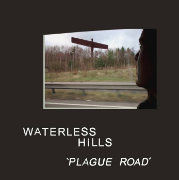
Home
|
WATERLESS
HILLS – PLAGUE ROAD
(Self
released on cassette/DL and available through Bandcamp)
Terrascope
Online readers might remember my enthusiastic
review of the debut release by Waterless Hills,
‘The Great Mountain’ earlier this year on
Cardinal Fuzz Records. The album, which resulted
from a one day improvised session in Manchester,
was a raw yet diverse release, rich in musical
imagery and imagination that perfectly suited
the inspiration for the session, the travel
writings of Freya Stark from the 1930’s. Perhaps
fittingly Waterless Hills have followed up with
this self-released cassette documenting their
first ever tour with pieces from dates in
London, Manchester, Newcastle and Sheffield. As
such it provides their own personal musical
travelogue telling the story of a tour which
just about managed to happen (in March of this
year) before the national lockdown that put paid
to indoor live music in small venues for who
knows how long.
Once
again the quartet of C. Joynes, Dan
Bridgwood-Hill, Andrew Cheetham and Gavin Clarke
display a fine musical understanding and some
wonderful playing. There is powerful playing but
also subtlety showing that all those years on
the local improvisation scene have certainly
taught them how to listen, respond, support and
allow space for each other. The result is a
dynamic and captivating audio document that
takes the raw materials of ‘The Great Mountain’,
takes it into the live setting and back again to
your living room without any loss of enjoyment.
Whilst
there are new pieces, much of the material
presented is based on pieces included on ‘The
Great Mountain’ albeit they are extended,
interrogated and explored a little further
through live interpretation. ‘Insect’ starts
proceedings and is a thrilling desert blues
inspired track, riding the momentum of rolling
drums and cymbals with a soaring guitar melody
that is raw and yet lyrical and indeed hypnotic.
‘Untidy’ is an extended, more spacious post rock
work out where violin and guitars intertwine and
create more of an obviously improvised piece,
exploring textures and colours of instrumental
sound that are tinged with Americana and even
(in the violin and bursts of exploratory
percussion) hints of earlier King Crimson.
‘Garden into Walantar’ gets the feet tapping
with an extended left field country/rockabilly
shuffle where drums, violin and guitars work up
a jaunty yet slightly off kilter melody and
rhythm that gathers energy and pace as it goes.
‘Horns’ begins with atmospheric, shimmering
percussion and violin that evolves into a
deeper, more intense and almost ‘Necks’ like
piece where the drama slowly unfolds providing a
real showcase for the violin which floats above
the rumbling minimalism beneath with some
beautiful melodic invention. ‘Law’ continues the
theme of more textural and spacious playing
where minimal eastern and surf themed guitar
melodies and rolling drums complement without
overpowering the violin which once again soars
above with great majesty. ‘Empty House’ is quite
wistful, mysterious and dark as the title might
suggest taking a slow shuffle and sparse melody
and slowly intensifying the sound to raise the
dramatic tension. Finally ‘Waverley’ is another
desert tinged, shuffling beat driven thing where
the beat and melody slowly loosen up and with it
the heat turns up a notch or two.
As
with their previous release Waterless Hills
bring a lot of influences to the table and in
terms of eclecticism and feel there are perhaps
shades of Sir Richard Bishop and Rangda but
Waterless Hills have their own unique recipe for
sure. This release documents a wonderful live
band in action, perhaps their natural home where
improvising and developing themes in the moment
can make the difference between a simply good
gig and a memorable one. You should catch them
live whenever and wherever that might next be
possible but in the meantime pick up a copy of
this release on limited edition cassette or
download to bring a little country dancing,
mystery and imagination into your daily lives.
(Francis Comyn)
|
|
|
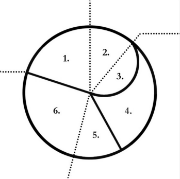
Home |
ADRA
– SIX PRINCIPLES OF EREWYREHVE
(Cassette/DL
on Borley
Rectory Records)
Andy
Abbott’s last outing under the Andrew DR Abbott
moniker was the wonderful ‘Dead In Chellow
Dean’, one of my favourite records of 2019 and
reviewed in these very pages. Here Andy shares
some of his ideas and work completed during
lockdown and reduces his full title to a simple
set of initials as he releases a home recorded
set of soundscapes highlighting the
possibilities of different instruments on each
track. They are spontaneous and unedited
compositions using minimal equipment, primarily
acoustic instruments, tape delays and loop
pedals to create what are described as
‘meditations’ or musings that may lead to
unlocking other sound worlds.
There
are six ‘untitled’ pieces each focusing on a
different instrument and its treatment albeit
each piece is given a simple description by its
instrument and a specific theme. The first piece
‘Mbira/Work’ is a beautiful short chiming
composition which naturally exudes an African
feel but also a lovely pianistic musical box
quality that is dreamy and transporting. In
stark contrast ‘Harmonica/Technology’ is a
lengthy drone piece where lonely and fogbound
siren calls overlap with buzzing and shimmering
electronic waves to create a stark and
mysterious, cosmic industrial noisescape albeit
with subtle effects and melodies running
through. There’s an almost glacial kosmische
raga like feel to the music as it evolves and
incorporates more tonal variation and
flourishes. It’s very hypnotic and engaging
indeed. ‘Split-Tin Guitar/Art’ is another
lengthy piece at over eight minutes and has a
modern ‘minimal’ composition feel that would to
these ears equally suit a cello. It uses a
gradually unfolding almost gamelan like melody
and slowly shifting and overlapping repetition
to great effect which also has a wonderful touch
of Robert Fripp in Discipline era King Crimson
or ‘crafty guitar’ mode. ‘Singing
Bowl/Knowledge’ once more passes the ten minute
mark. It is a piece of two halves opening with
an intense ceremonial style rhythm played with a
harsh, industrial percussive quality over which
a series of sparse singing bowl ringing tones
eventually bring some light. The second half of
the piece becomes less rhythmic and more focused
on electronic treatment and as such is more
kosmische and spectral in nature. It’s an
interesting experiment in light and shade.
‘Ocarina/Economy’ has the sound of mysterious
and lost cultures in its spacious, minimal, part
primitive/part medieval/part otherworldly sounds
and it’s a beautiful place to be. To finish we
have ‘Acoustic Baritone Guitar/Love’ and it’s a
gorgeous, upbeat Americana drenched guitar tune
that provides a perfect finale to a fascinating
journey of sound and imagination.
Going
back to the theme of this release i.e.
meditations that may lead to unlocking other
sound worlds I would happily conclude that it
does precisely that. Given the limitations of
home recordings and minimal use of
instrumentation there is a wonderful array of
sounds and ideas in play here and it’s a very
engaging listen. This release is in advance of
the next full album release by Andy Abbott and
based on his meditations as included here, that
is a record I am very much looking forward to.
Meanwhile this release is available as a very
attractive cassette package and you could do a
lot worse than enter the mind of Andy Abbott
briefly via that route.
(Francis
Comyn)
|
|
|
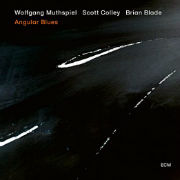
Home
|
WOLFGANG
MUTHSPIEL
– ANGULAR BLUES
(LP/CD/Digital
on ECM
Records)
Austrian
jazz guitarist Wolfgang Muthspiel has been
making music since the 80s, with a discography
well in excess of 40 albums, many on his own
label Material Records, and others in recent
years on ECM. From
a career spanning many band formats including
duos, trios, quartets and quintets, on Angular
Blues he revisits the trio, with Americans,
drummer and long-time collaborator Brian Blade
(Wayne Shorter, Herbie Hancock, Chick Corea) and
double bassist Scott Colley (Michael Brecker,
Pat Metheny, John Scofield) replacing frequent
Muthspiel bass partner Larry Grenadier.
The
album was recorded in Japan in a single day in
August 2018, following the group’s three night,
six show run at Tokyo’s Cotton Club, and mixed
by producer and ECM label founder Manfred
Eicher. The
mood is laid back, understated, melodic, upbeat
and unflashy.
Muthspiel
plays nylon acoustic guitar on the first three
tracks. Opener
“Wondering” is introduced by drummer Blade, with
the melody beautifully rolled out not by
Muthspiel, but by Colley on bass.
Muthspiel makes a slightly surprising
delayed entrance, his playing lyrical and fluid.
Muthspiel and Colley trade solos in a
piece that nicely sets up the rest of the album
– easy does it, smooth and comfortable.
On
the title track Muthspiel cites influences of
Chick Corea and Thelonious Monk - interesting as
there’s not a piano in sight - but I can hear
both references.
The song is full of jagged, jabbing,
off-kilter lines that never let you find your
bearings. But
the precision and mind reading in the interplay
between the musicians is undeniable.
The solemn, elegiac and pensive
“Hüttengriffe” is so lyrical I thought it was a
classical standard, but no, it’s a Muthspiel
original. One
could easily picture it played twice as fast,
with an equal amount of intensity and pathos.
With
“Camino,” and for the remainder of the album,
Muthspiel switches to electric guitar.
The trio stretches out a bit more, but
the song makes use of space the way Muthspiel
intended for the entire album, saying “with this
trio, it’s about playing with space:
leaving it, creating it, filling it.”
“Ride” is exactly as the title implies, a
lively, too-short, bebop flight plan up and down
the fretboard. Drummer
Brian Blade plays a short solo as well, which is
a welcome departure, as his playing throughout
most of the album is intentionally low-key, very
less-is-more.
The
Cole Porter standard “Everything I Love” is one
of two tracks on the album not written by
Muthspiel, the second being “I’ll Remember
April,” which Muthspiel first heard on a Frank
Sinatra album. Both
songs are given fine treatments, with relaxed,
tasteful and appealing voicings throughout.
The
album’s two most interesting tracks are the
related “Kanon in 6/8,” followed immediately by
“Solo Kanon in 5/4.”
The former is lengthier, with the band in
full swing. The
interplay between all three musicians has drama
and attack, with Muthspiel’s guitar work
stellar. But
the album wouldn’t be able to earn its ECM merit
badge without some degree of experimentation and
invention, and those take the form of
Muthspiel’s use of a delay effect on his guitar.
While it’s used sparingly yet excitingly
on “Kanon in 6/8,” Muthspiel takes full flight
with the delay or looping in “Solo Kanon in
5/4.” While
looping has sort of taken over the world in
recent years, I haven’t heard it much in a jazz
setting, and in Muthspiel’s sure hands it’s a
natural fit. It
has the effect in “Solo Kanon in 5/4” of
reminding me of a classical fugue by another
composer from that neck of the woods, that Bach
fellow. (“Performing
a fugue with a looping pedal?
Och, it’s heresy!” – J.S. Bach, 2020).
Angular
Blues is subtly played, enjoyable sound for
acoustic and electric guitar jazz trio.
Restrained and elegant, with Wolfgang
Muthspiel, Scott Colley and Brian Blade, you’re
in the hands of seasoned pros who make every
musical phrase count.
Recommended.
(Mark
Feingold)
|
|
|
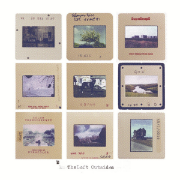
Home
|
THE
LEFT
OUTSIDES – A PLACE TO HIDE
(LP
from
Cardinal Fuzz and Feeding Tube Records and
from https://theleftoutsides.bandcamp.com)
The Left Outsides have graced so many fine Terrascope event over the
years, from the legendary London Tea Party of
2008 with Bevis Frond and Nick Nicely
to last year’s Woolf Music. We simply never tire
of them. How gratifying, then,
that Cardinal Dave and our old mate Byron Coley
at Feeding Tube Records have
seen fit to release a stunningly good live
document of Alison Cotton (voice,
harmonium, viola) and Mark Nicholas (voice,
guitar).
Recorded not on our watch but at one of their support stints to Robyn
Hitchcock
a couple of years back, A
Place To Hide
was given a dry run by way of limited run CD-r
on the Borley Rectory label in
2019. Here it finds a welcome home on
Terrascope’s favoured medium (no not
cassette....) Six tracks feature, one of which
is new to these ears, at
least in its recorded format. It’s ‘My
Reflection Once Was Me’ that in fact ushers
us in, hushed and reverentially. The harmonium
driven funereal drone and a
deadpan vocal delivery will inevitably provoke
an obvious and perfectly
apposite comparison but there is more, so much
more to this hymnal incantation than
”hey fangirl, hey fanboy”. The more discerning
and indeed fortunate among you
will recognise ‘Young Girl Cut Down In Her
Prime’, a rendition of which Mark
and Alison generously contributed to
Terrascope’s Paper Leaves LP a few years back (waddya mean you didn’t buy one?
Get thee to Discogs, it’s probably your only
hope now). Keeping up with the
Drones, the subtle and suitably mournful
accompaniment interspersed with
acapella interludes emphasises how the music, as
much as narrative, is capable
of conveying the story.
One of three numbers taken from the then-current album All
That Remains, ‘Naming Shadows Was
Your Existence’ would easily work as an up-tempo
slice of psych/pop pitched
somewhere between the Tourists and Dandy
Warhols. In these hands though it is a
sombre, slo-mo lament, notwithstanding some
abundantly melodic vocals and
reined-in power chords. In fact Mark’s
tastefully restrained guitar is a
feature throughout, although with more emphasis
on harmonium (and perhaps due to
possessing only one pair of hands) Alison’s
viola is used more sparingly than I
recall from previous output. However when
deployed it is with economic and usually
spine tingling efficiency.
Now all that I’ve described is impressive, of that there is no doubt.
However, it’s a mere bagatelle in comparison
with the other three numbers here.
‘All That Remains’ is one of the best tunes that
anyone, anywhere, has handed
down for posterity, a wistful ballad of such
pristine quality that it is pretty
much equal to anything within the folk (soft)
rock canon. Bold statement but
there you go. You recall I mentioned the
devastatingly effective viola parts
earlier? I rest my case. This song gets me every
time especially the chorus in
which Alison and Mark’s voice intertwine like
twisting willow on the banks of
some languid stream. Speaking of which, ‘Down To
The Waterside’ provides Mark
with his sole lead vocal here, a disarmingly
unfussy and beautifully constructed
minor key summer’s day delight while all the
time the lingering mists of
melancholy hover over the still waters.
All of which leads us to ‘Splash #1’ that most sensitive and sublime of
13th Floor Elevators compositions,
its wistfulness and cadence ideally
suited to The Left Outsides treatment and proof
if it be needed that Alison and
Mark are fine interpreters of others’ music. If
you are lucky you may still be
able to find their version of Nick Saloman’s
‘Stain On The Sun’ from the first
Woolf Music on Soundcloud. It’s another one
where I invariably find I have
something in my eye. Again there’s that vocal
interplay, this time a duet from
start to finish, and that periodic soaring viola
over the steady, rich
semi-acoustic guitar tones. It remains faithful
to the original while somehow
injecting a further dimension of ultra-appealing
other-worldliness. Unconventionally,
a guitar/harmonium drone plays us out and so
endeth the song and indeed the
set.
Not wishing to detract in any way from the original CDR release, which
has a certain pride of place here at the Veal
Crate, but what lifts this to a whole new level is that it has been
remastered for vinyl as a result of which it
sounds phenomenally good, even
when listened to as a digital press pack. The
richly analogue sounding
treatment ensures that the at once sparse yet
majestic instrumentation expands
to fill the room while still making plenty of
allowance for space, much like a
classical or devotional music recording. It all
contributes to the prevailing
feel of moodiness without the meanness, a
performance and production of jaw-dropping
quality and destined to be in short supply any
time soon.
(Ian
Fraser)
|
|
|
|
 |
|

